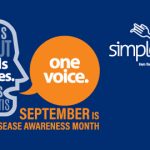 Living with a rheumatic disease presents unique challenges, but patients have the power to live better and become more informed about issues affecting their care thanks to new ACR tools launched this September as part of Rheumatic Disease Awareness Month (RDAM).
Living with a rheumatic disease presents unique challenges, but patients have the power to live better and become more informed about issues affecting their care thanks to new ACR tools launched this September as part of Rheumatic Disease Awareness Month (RDAM).
“A month dedicated to rheumatic disease awareness provides the perfect opportunity for rheumatologists to empower their patients in actions that can lead them to a better quality of life,” according to Christopher A. Mecoli, MD, MHS, a member of the ACR’s Communications and Marketing Committee and a rheumatologist and instructor of medicine at Johns Hopkins University School of Medicine, Baltimore.
“It’s common for patients and their providers to focus on the medications to manage their disease; however, understanding other aspects of rheumatology care, such as fitness, diet and advocacy, can be enlightening and powerful, and this can begin with open and honest communication between patients and providers,” Dr. Mecoli says.
He shares how patients and providers can start this conversation by leveraging the ACR’s new tools: the patient Pledge to Live Well and the Rheumatic Disease Report Card.
Take the Pledge
The ACR’s new Pledge to Live Well gives patients a chance to commit to lifestyle habits that will help improve their quality of life. Such habits include exercising regularly, following a balanced diet, taking care of their mental health, being an active participant in their care, following their treatment plan and advocating for their care. All pledge takers will receive a pedometer and wristband to encourage them to stay active.
Dr. Mecoli is encouraging his patients to take the ACR pledge as one way to help them stay physically active to maintain muscle mass, function and mobility. He says the ACR pledge also empowers patients with knowledge about their ability to advocate for themselves by understanding their healthcare and speaking up for improved care in their own clinic and through legislation.
“Patients are incredibly powerful advocates in speaking up about aspects of their care, such as the price of medications and therapy services,” he says.
Share Your State’s Report Card on Access to Care
In honor of RDAM, the ACR is launching a first-of-its-kind Rheumatic Disease Report Card, which seeks to answer the question: “How easy is it to live with rheumatic disease in my state?” The report card assigns states letter grades according to their progress on:
- Providing adequate access to rheumatology care;
- Ensuring rheumatic disease care is affordable; and
- Encouraging healthy lifestyle habits that ease the burden of rheumatic disease.




